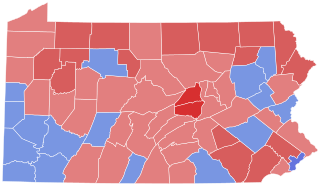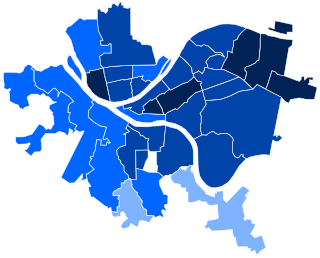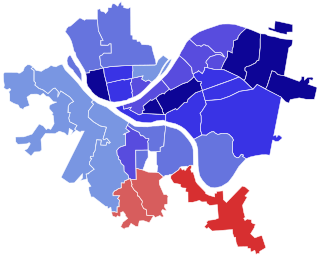
David Leo Lawrence was an American politician who served as the 37th governor of Pennsylvania from 1959 to 1963. The first Catholic elected as Pennsylvania's governor, Lawrence is the only mayor of Pittsburgh to have also been elected as Governor of Pennsylvania. He served four terms as mayor, from 1946 through 1959. A panel of 69 scholars in 1993 ranked him third among the ten best mayors in American history.

The mayoral election of 2007 in Pittsburgh, Pennsylvania was a special election held on Tuesday, November 6, 2007. The incumbent mayor, Luke Ravenstahl of the Democratic Party faced Republican challenger Mark DeSantis, a telecommunications executive and adjunct professor at Carnegie Mellon University. The race was notable for the strength of its Republican challenger, rare in Pittsburgh, and the election of such a young mayor, Ravenstahl being 27 years old at the time. Ravenstahl was elected with a comfortable margin in an election marked by unusually cold weather but record voter turnout.

Pittsburgh held a mayoral election on November 3, 2009. Incumbent mayor Luke Ravenstahl, a Democrat, defeated his two independent challengers by a wide margin. The 2009 election was the first regular-cycle election in which Ravenstahl participated; he was originally appointed as an interim mayor to succeed Bob O'Connor and subsequently won a special election in 2007.

The mayoral election of 2005 in Pittsburgh, Pennsylvania was held on Tuesday, November 8, 2005. The incumbent mayor, Tom Murphy of the Democratic Party chose not to run for what would have been a record fourth straight term.

The mayoral election of 1997 in Pittsburgh, Pennsylvania was held on Tuesday, November 4, 1997. The incumbent mayor, Tom Murphy of the Democratic Party was running for a second straight term.

The Mayoral election of 1933 in Pittsburgh, Pennsylvania was held on Tuesday, November 6, 1933. In a realigning election, Democrats regained control of the mayor's office for the first time in twenty-eight years; they have not relinquished this position since.

The 1958 Pennsylvania gubernatorial election was held on November 4. Democrat David Lawrence defeated Republican Art McGonigle by a smaller than anticipated margin.

The 1959 Pittsburgh Special mayoral election was held on Tuesday November 3, 1959. The winner of the 1957 election, Democrat David Lawrence, had resigned from his position in January 1959 because he was elected Governor of Pennsylvania. City Council President Tom Gallagher moved up to the position of mayor per the city charter. At 75 years old, he chose not to seek reelection. Joe Barr, also a Democrat, won the special election and the remainder of Lawrence's term. Barr, a powerful State Senator and a longtime Lawrence associate, defeated Republican Paul Reinhold, the president of a company that distributed road repair equipment.

The Mayoral election of 1953 in Pittsburgh, Pennsylvania was held on Tuesday, November 3, 1953. David Lawrence of the Democratic Party won the right to serve a third term. With a broad base of support among both labor and minority voters, as well as the quiet background support of many GOP business leaders, Lawrence coasted to an election win. His victory came over Leonard Kane, a real estate developer and the brother of the Allegheny County Treasurer.

The Mayoral election of 1949 in Pittsburgh, Pennsylvania was held on Tuesday, November 8, 1949. David Lawrence of the Democratic Party was reelected to a second term. Despite commanding a powerful position within both local politics and the state party, Lawrence faced a major primary challenge after he failed to gain the endorsement of the AFL–CIO. However, he achieved a moderate victory over union leader Ed Leonard, in part due to the surprising support of the Republican business community, which championed Lawrence's urban renewal projects. After the primary scare, Lawrence defeated Republican Timothy "Tice" Ryan, an attorney, by what was then the biggest margin in city mayoral history.

The Mayoral election of 1945 in Pittsburgh, Pennsylvania was held on Tuesday, November 6, 1945. Incumbent Democratic Party Conn Scully chose not to seek reelection. State Democratic Party chairman and longtime Pittsburgh political player David Lawrence was elected to succeed him in what is the city's most recent competitive race. Bob Waddell, the popular football coach of Carnegie Tech ran for a second time using his colorful personality and sports fame. However, the powerful Lawrence was able to rally a large base en route to a close win.

The mayoral election of 1941 in Pittsburgh, Pennsylvania, was held on Tuesday, November 4, 1941. Incumbent Democratic Party Conn Scully won a second full term by a narrow margin.

The Mayoral election of 1937 in Pittsburgh, Pennsylvania was held on Tuesday, November 2, 1937. Incumbent Democrat Conn Scully, the former City Council President who had assumed the executive rank in October 1936, after the resignation of William McNair, was elected to a first full term.

The Mayoral election of 1929 in Pittsburgh, Pennsylvania was held on Tuesday, November 5, 1929. Incumbent Republican mayor Charles H. Kline was re-elected over Thomas A. Dunn, who ran on the Democratic and Good Government party tickets. Until this election, no mayor of Pittsburgh had won consecutive terms since Henry A. Weaver in 1858, owing in part to a prior long-standing law prohibiting a mayor from succeeding himself. To date this was the last time a Republican was elected mayor of Pittsburgh.

The 2013 Pittsburgh mayoral election took place on November 5, 2013. Democrat Bill Peduto was elected the 60th Mayor of Pittsburgh, Pennsylvania. The primary election was held on May 21, 2013. Incumbent Democratic Mayor Luke Ravenstahl, although eligible for a second full term, did not seek reelection as Mayor of Pittsburgh.

The 2017 Pittsburgh mayoral election took place on November 7, 2017. The primary election was held on May 16, 2017. Incumbent Democratic Mayor Bill Peduto successfully ran for re-election to a second term. Three Democrats, including Peduto, and no Republicans filed petitions to appear on the respective primary ballots before the deadline on March 7, 2017. Peduto won the Democratic primary and was officially unopposed in the general election.

The 1925 Pittsburgh mayoral election was held on Tuesday, 3 November 1925. It resulted in a landslide victory for Republican candidate Charles H. Kline.

The 2021 Pittsburgh mayoral election took place on November 2, 2021. The primary election was held on May 18, 2021. The Democratic nominee, State Representative Ed Gainey, defeated the Republican nominee, retired police officer Tony Moreno.

The 1921 Pittsburgh mayoral election was held on Tuesday, November 8, 1921. Republican nominee William A. Magee was elected by a large margin over Democratic candidate William N. McNair.

The 1913 Pittsburgh mayoral election was held on Tuesday, November 4, 1913, in Pittsburgh, Pennsylvania. Joseph G. Armstrong was elected mayor of Pittsburgh over Stephen G. Porter in a nonpartisan election.











